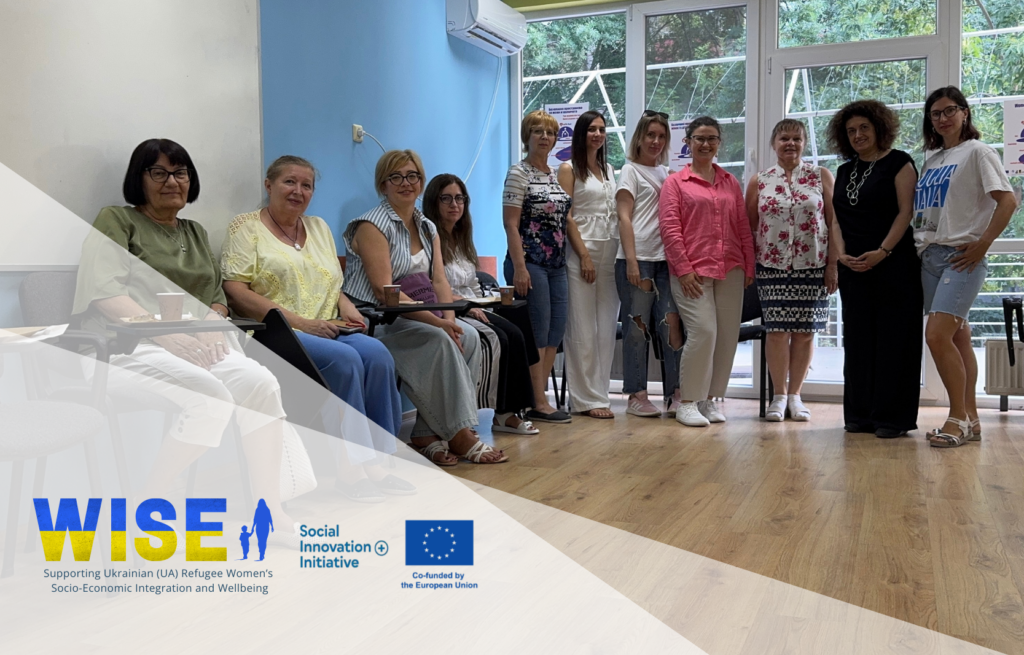WISE Project partners launch the needs assessment phase in Sofia
04/09/2025

We are delighted to share that WISE partners have embarked on the needs assessment phase of the project. This stage is essential to ensure that WISE integrated holistic approach is shaped by the real experiences and challenges faced by Ukrainian refugee women. The Holistic Support Center (HSC) model will be designed as holistic centres.
As part of this phase, WISE partners are conducting Key Informant Interviews (KII) with relevant stakeholders. The aim is to gather comprehensive insights to adapt activities to the local context, develop a HSC model together with key stakeholders and UA refugee women, and later contextualise the development of the AI-powered tool for skills assessment. The HSC will integrate mental health and psychosocial support with employability and social services, including job readiness, skills assessment, skills building, mental health support, personalized case management, mental health and psychosocial support group activities with gender perspective.
The interviews target a wide range of actors, including Ukrainian refugee women as well as education and service providers.
In addition, the first focus group discussion was organised by the Animus Association Foundation in Sofia (Bulgaria) on 16 June 2025, with nine Ukrainian women taking part in a safe and supportive environment. The session was conducted in person and followed a semi-structured format, using guiding questions to encourage open dialogue and sharing of experiences.
Profile of focus group participants
The women represented a wide range of professional backgrounds, including teaching, psychology, the arts, finance, and beauty services. Most arrived in Bulgaria in 2022, although a few have been resident for more than three years. Despite their high levels of education and professional expertise, many remain either unemployed or engaged in low-paid and precarious work. Several are also the sole providers for children or relatives with disabilities, which places additional strain on their ability to access stable employment.
Main Insights
Barriers to Employment
The most pressing challenge faced by participants is their limited command of Bulgarian and English, which restricts access to most formal job opportunities. Although many of the women possess higher education or professional qualifications, they are unable to practise in their fields due to certification requirements or insufficient language proficiency. Family responsibilities, particularly childcare, further limit the ability to commit to full-time positions. Several women reported being offered only informal work arrangements, which often lack security and expose them to labor exploitation. In addition, age discrimination was highlighted, affecting both younger women in their mid-thirties and those over sixty.
Voices from the focus group
“I need to work, but I can’t take just any job. I have a daughter to collect from school.”
“I was a psychologist in Ukraine. Here, I can’t practise because I don’t know the language well enough.”
“I rented a place to work as a beautician, but the landlord didn’t make a contract. I agreed. And then problems started.”
The consultation in Sofia highlighted that Ukrainian women encounter multiple and overlapping barriers to entering the labour market, including language, discrimination, care responsibilities, and legal uncertainties. Nevertheless, they demonstrate resilience, motivation, and a strong skills base. Clear information, tailored support, and targeted job-matching initiatives will be essential to unlock their potential and enable fair access to employment.
More about WISE project
WISE – Supporting Ukrainian Refugee Women’s Socio-Economic Integration and Wellbeing, an ESF+ funded project that supports employable refugee women from Ukraine in Italy and Bulgaria to improve their social and economic inclusion.
Through four Holistic Support Centres (HSCs) in Sofia, Milan, Rome, and Turin, WISE combines mental health and psychosocial support with tailored employment services. A contextualised AI tool helps participants identify their skills, explore career paths, and access opportunities, supporting a smoother
integration into the workforce and society.
Running from April 2025 to October 2026, WISE aims to reach 200 employable refugee women fleeing the war in Ukraine and their dependents, providing comprehensive support and guidance during this critical period.
Project Partners: Animus Association Foundation (AAF), Centro PENC Antropologia e Psicologia Geoclinica, EARLALL, Fondazione IRC Italia, Laboratorio di Gruppoanalisi (LdG), and Skillab.

